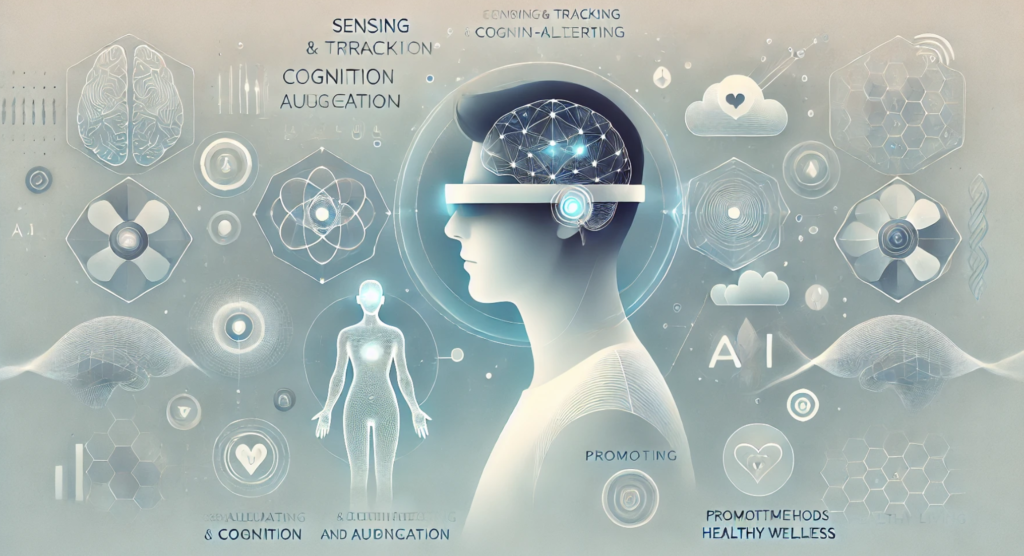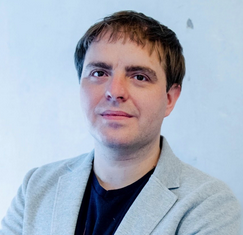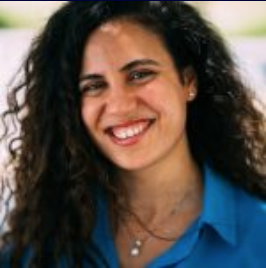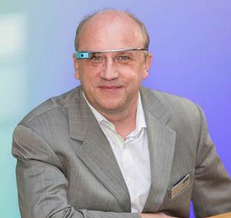MobiCHAI’25 – 2nd International Workshop on
Mobile Cognitive Augmenting and Cognition-Altering Technologies using Human-Centered AI
Dalle’s intepretation of the workshop topic (source of image: Dalle)

Enhancing human cognition has always been a key driver of innovation and societal advancement. Cognition-altering technologies (CAT) aim to improve cognitive capabilities, impacting fields such as education, decision-making, healthcare, and productivity. With the rise of Human-Centered AI (HCAI) and Hybrid-Human-AI (HHAI), there is an unprecedented opportunity to develop technologies that not only mimic but also actively augment human cognition in real-life scenarios. This will be the focus of this year’s MobiCHAI Workshop
Format and Tentative Schedule
We are proposing a full-day workshop for anyone interested in attending, nevertheless circumstances might require to reduce the lenght of the workshop to a half day workshop. Therefore this schedule is tentative:
After the welcome and introduction it will begin with a keynote presentation, followed by the first presentation session for accepted submissions.
3-4 smaller working groups will be formed to address specific subtopics. The goal of these breakout sessions is to invite people from the different communities to engage in discussions based on the previously presented papers. This first breakout session will focus on identifying key research priorities for the community around CAT and how they can be included in presented submissions.
After the lunch break, break out groups should of the morning session will present their insights gained in the break outs. Afterward, the second presentation session will take place. This will, once again, be followed by the second break-out session. This second breakout session will focus on discussing the challenges and opportunities of AI for CAT in a series of proposed scenarios in areas of cognitive healthcare, work, and education, but also in the respective submissions of the workshop participants.
The workshop will conclude with a demo poster/discussion session where participants will be able to show demos of their accepted submissions and possible outcomes of the breakout sessions will be presented. The main goal of the demo/discussion session is to allow both communities to meet people outside their respective research areas to create new opportunities for collaboration.

Scope and Topic
In the mobiCHAI workshop, we aim to have an interdisciplinary group of researchers including but not limited to education and didactic, health- and mental care, fitness and well-being, economy, sociology, and others. However, we expect the majority of submissions to come from computer science from system designers.
Sensing and Tracking Cognition
Ubiquitous sensing and physiological monitoring for cognitive state detection. Non-intrusive tracking of cognitive load and emotional states. Integrating multi-modal data (video, sound, textual) to model cognition
Modeling and simulating cognition
Methods such as machine learning algorithms but also generative AI methods to model cognitive processes are part of this topic. Questions like the simulation of users in tasks and design processes should be answered as well as how to help CAT builders better design their systems but having accurate approximations of human behavior
AI Methods for Cognitive Alteration and Augmentation
How can we create a new CAT to alter or augment human cognition? Participants are invited to submit proposals for new ideas for applications that affect cognitive functions or give users new ones (if possible). Such applications areas can include but are not limited to business, education, health care, and fitness.
Cognitive Augmentation for promoting healthy living
This topic particularily focuses on promoting healthy livestyles using CAT
Interactive Methods in CAT
AI-mediated interventions for habit formation and behavioral change. Techniques for AI-supported decision-making and problem-solving. Cognitive scaffolding via wearable and mobile AI assistants
Ethic and societal implications of CAT
Privacy and ethical concerns in AI-driven cognitive enhancement, Balancing augmentation and human autonomy, Responsible design principles for cognitive AI systems
Submissions to this workshop will take the form of full and short papers:
- Full papers (up to 6 pages) should report reasonably mature work within the scope of mobiCHAI and are expected to demonstrate concrete and reproducible results. Accepted full papers will be presented and discussed in 10-minute slots.
- Short papers (up to 2 pages) are encouraged to re-port novel and creative ideas that are yet to produce concrete research results but are at a stage where community feedback would be useful. Short papers could also include provocations for envisioned systems/benefits/ or risks of CAT. Accepted short papers will be presented at the Workshop in 3-minute slots.
- Abstracts (up to 1 pages) are encouraged to present novel and creative ideas that have not been deployed yet and would greatly benefit from discussions to form concrete plans. Accepted short papers will be presented at the Workshop as One-slide pitches.
Submission
Deadline for submissions: August 10, 2025
Notifications of acceptance: August 20, 2025
Rolling submission for Abstracts
Submission Link: easychair
Submissions should follow the ACM Master Article Templates documentclass[sigconf]{acmart}.ass[sigconf]{acmart}.
After submission, the papers will be divided for review between the workshop organizers and the invited reviewers (at least 2 reviews per paper). Reviewing will be based on quality and relevance to the workshop topics. After discussion of all submissions, accepted papers will be invited to the workshop. All papers will be digitally available through the workshop website. At least one author of an accepted submission must attend the workshop.
Organizers

Agnes Grünerbl
DFKI and RPTU

Jan Spilski
RPTU

Julia Barbareschi
Keio University

Kai Kunze
Keio University

Thomas Lachmann
RPTU and CINI

Passant El’Agroudy
DFKI and RPTU

Paul Lukowicz
DFKI and RPTU
MobiCHAI’25 is supported by:
Previous Workshops: MobiCHAI’24